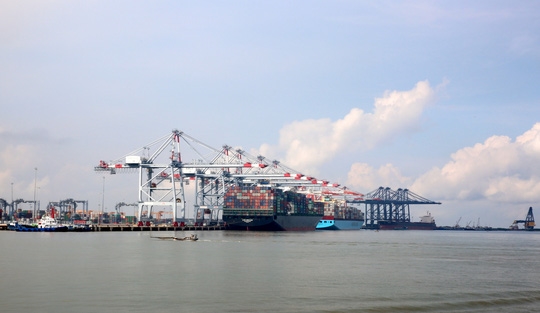 Society
Society

Infrastructure around the Cái Mép – Thị Vải port cluster, the only port cluster that can receive large container vessels in Việt Nam, is expected to be upgraded so that it can become a major national and international port.
 |
| Cái Mép-Thị Vải receives large container vessels which travel directly to Europe and the US without the need to transit through a third country. — Photo nld.com.vn |
BÀ RỊA–VŨNG TÀU — Infrastructure around the Cái Mép–Thị Vải port cluster, the only port cluster that can receive large container vessels in Việt Nam, is expected to be upgraded so that it can become a major national and international port.
Cái Mép-Thị Vải receives large container vessels which travel directly to Europe and the US without the need to transit through a third country.
Though cargo volume through the port has risen 16 per cent annually over the last five years, insufficient infrastructure, including connecting roads, has slowed growth, according to a report from the Bà Rịa-Vũng Tàu Province’s People’s Committee.
Road 965, for example, is the only road that connects to National Highway No. 51 and to roads leading to industrial parks near the port cluster.
While roads inside the port cluster are now being built, construction of the Phước Hoà-Cái Mép Road and 991B Road are only in the planning stages as there is a capital shortage.
To expedite travel and meet demand, Bà Rịa-Vũng Tàu Province authorities have asked the central government to speed up construction of Biên Hoà-Vũng Tàu Expressway which links Cái Mép-Thị Vải with several southern provinces.
Though the port system can accommodate the world’s biggest vessels, the Vũng Tàu-Thị Vải navigation channel has not been dredged effectively.
During a meeting with Deputy Prime Minister Trịnh Đình Dũng, who led an inspection delegation to the port cluster last weekend, provincial leaders suggested that the government dredge Vũng Tàu-Thị Vải navigation according to the 16-metre standard used to receive large vessels.
Dũng told local leaders that the Cái Mép-Thị Vải port cluster was an important international transit port contributing greatly to socio-economic development and that it had received investment priority for high-tech equipment that would help increase cargo-loading capacity.
However, Dũng said the port cluster still faced limitations, including zoning, connectivity and transport infrastructure, mostly due to poor management of the port cluster zone.
“The Ministry of Transport can’t be responsible for everything,” said Dũng, adding that infrastructure connectivity both inside and outside the port system was badly needed.
He suggested mobilising capital from various sources, including the private sector, to improve connections between Cái Mép-Thị Vải and HCM City and other localities in the region.
In response to suggestions from the local authorities, Deputy PM Dũng has asked ministries and sectors to conduct a feasibility study on navigation dredging for very large vessels.
Nguyễn Văn Trình, chairman of Bà Rịa-Vũng Tàu Province’s People’s Committee, said the effectiveness of the port remained low, at 1.2 million TEUs a year, equivalent to 18 per cent of the port cluster’s capacity.
Original plans called for Bà Rịa-Vũng Tàu to have a total of 57 seaports. Twenty-eight of them have been built with US$2 billion. All of the built ports are in use, with total annual loading capacity of 98.9 million tonnes.
At the Cái Mép-Thị Vải port cluster, 17 ports are in use, with total annual loading capacity of 93 million tonnes. There are an additional 35 projects in the planning stage.
In addition, a number of container ports at Cái Mép-Thị Vải, worth VNĐ27 trillion, opened in 2009, with annual loading capacity of 6.8 million TEUs.
Every week, there are 20 turns of vessels over 80.000 DWT, including an average of two with loading capacity of 160,000 DWT, departing from the port cluster.
With the advantages of deepwater ports, the travel time between Việt Nam and other countries is shortened, leading to better service quality and cost effectiveness.
However, in recent years, the supply of goods shipped through the port system has not reached the predicted figure, despite great investments in high-tech equipment from many ports.
According to the Việt Nam Marine Administration, services at the port cluster have not developed well, and along with underdeveloped infrastructure, the port complex has been unattractive to transport firms.
The Cái Mép–Thị Vải port complex opened in late January 2013 after four years of construction.
The project was financed by Japan’s Official Development Assistance (ODA) loans and reciprocal capital from Viêt Nam.— VNS




